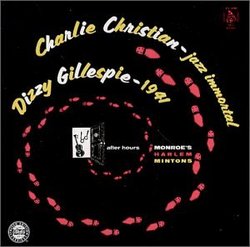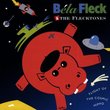| All Artists: Charlie Christian, Dizzy Gillespie, Thelonious Monk Title: After Hours Members Wishing: 3 Total Copies: 0 Label: Ojc Original Release Date: 1/1/1941 Re-Release Date: 5/9/2000 Genres: Jazz, Pop Styles: Swing Jazz, Bebop Number of Discs: 1 SwapaCD Credits: 1 UPCs: 025218193221, 090204922826 |
Search - Charlie Christian, Dizzy Gillespie, Thelonious Monk :: After Hours
 | Charlie Christian, Dizzy Gillespie, Thelonious Monk After Hours Genres: Jazz, Pop
No Description Available. Genre: Jazz Music Media Format: Compact Disk Rating: Release Date: 16-MAY-2000 |
Larger Image |
CD DetailsSynopsis
Product Description No Description Available. Genre: Jazz Music Media Format: Compact Disk Rating: Release Date: 16-MAY-2000 Similarly Requested CDs
|
CD ReviewsEssential, historical, and timeless. jazzfanmn | St Cloud, MN United States | 02/21/2001 (5 out of 5 stars) "In 1941 a young man named, Jerry Newman brought a portable recorder to the legendary jazz club in Harlem called Minton's. What he recorded is little short of priceless. Cut in May of 1941 this music features, among others, electric guitar pioneer Charlie Christian, Dizzy Gillespie then a young trumpeter just beginning to emerge from Roy Eldridge's shadow, the cool toned tenor of Don Byas, a young drummer who was radically altering the approach of jazz drummers named Kenny Clarke, and a little known house pianst named Thelonious Monk. There are two reasons this music is so vital. First, the performances are outstanding. Christian is transcendant in his soloing. His lines are crisp, and swing hard as anyone, and for this listener THE reason to pick up this disc. He is afforded the opprotunity to really stretch out and dig into the music that the standard three minute record of the day simply could not allow, just listen to "Swing to Bop" and "Up on Teddy's Hill". Gillespie is in a transitional phase of his playing, only just beginning to come into his own, but one hears glimpses of his greatness on "Kerouac". Monk is identified as the pianist on "Swing to Bop" and "Stomping at the Savoy". One has to strain to listen even as he solos as the piano is very soft, most likely far from the mic, but one hears enough to tell his playing is still stride based and displays little of his trademark style. These performances of Monk and Gillespie at such a stage gives the fan a perspective of just how young they were, and how far they would come. The second reason to pick this cd up is for it's historical value. At the time this music was very much underground and ignored by nearly everyone outside of the musicians and a small base of dedicated fans. This recording gives us the briefest glimpse of the music that would become "be-bop" in it's infancy, and is an indespencable historical document. The sound quality is suprisingly high considering the source materials are the discs mr. Newman cut on his portable, and then listened to countless times. While not in the catagory of audiophile quality, there is very little audible analog hiss, and most of the musicians (save the rhythm section, which is muffled thorughout) come through loud and clear. This disc is a must for fans of bop, Christian, Gillespie, and fans looking to fill holes in the development of jazz styles, I recommend it highly." Good stuff but don't be misled jazzfanmn | 10/04/2003 (3 out of 5 stars) "Those of you more observant than I will have already deduced that this is NOT a collaboration between Charlie Christian and Dizzy Gillespie, with Monk thrown in for good measure. It is part Charlie Christian album (tracks 1-5) and part Dizzy Gillespie album (6-9) with Monk playing on TWO of the Christian tracks, and not very noticeably (or even audibly) on either of them. The recording quality is adequate, about how you'd expect a live 1941 jazz club recording to sound; doesn't ruin the album, but is hard to ignore at times. Plenty of great music here, far ahead of its time, and especially a fascinating showcase for Christian away from his more (relatively) conventional work with Benny Goodman, and in the final year of his too-short life. This is the sound of bebop being born, and worth it for that alone, but if you were expecting an all-star session like I was, you've been warned." RARE LOOK INTO THE TRANSITION TO BOP. bunnyeater | 01/05/2005 (5 out of 5 stars) "Recorded in 1941 at Monroe's Uptown House and Teddy Hill's Minton's Playhouse, this recording is considered to be the first and one of the only recodings of the early transistion to Bop. If you do not know there was a recording lockout in the early to mid 40s and only V discs were made. These were big name artists and bands. The transitional music that was going on in the clubs was pretty much left unrecorded. It was only because a private collector, Jerry Newman, brought his own recording device to these clubs that these recordings even exist. Before these were even put to LP originally, Jerry Newman played the discs he made over and over. That accounts for why the sound quality is not quite perfect. Bebop didn't happen overnight but there is no recorded history of it. But this recording does exist and speaks out for the rare talent Charlie Christian had. He helped make the path along with others like Dizzy for the creation of Bebop. This does not deserve anything but 5 stars. This recording is a rare piece of history. Big bands didn't call for long uninterupted solos like were allowed to be performed here on this CD. Minton's was also a jam place for among others Parker. BOP WOULD HAVE NEVER EXISTED IF IT WERE NOT FOR JAM SESSIONS LIKE THIS. AGAIN I SAY THIS IS A HISTORIC RECORDING. NOTHING ELSE LIKE THIS WAS RECORDED IN THE EARLY TO MID 40S. THIS IS THE EARLIEST BEBOP.
No one played like Charlie in the early 40s. His and Dizzy's talent shine on this disc. Hope this is helpful, Norman W. Nonnweiler. " |

 Track Listings (9) - Disc #1
Track Listings (9) - Disc #1